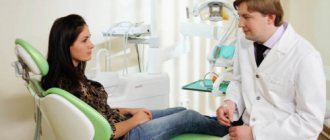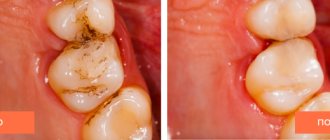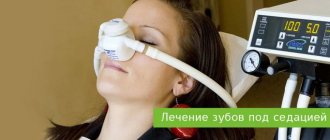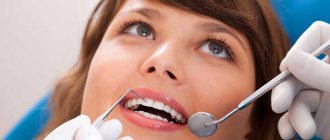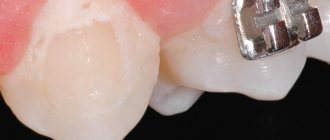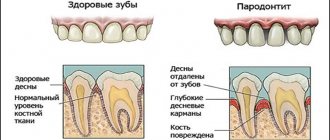Toothache occurs throughout life, most often when you don't expect it. Problems can begin even for those who carefully and constantly care for their teeth. But there is a period of life when teeth are especially vulnerable - pregnancy. Carrying a child is a difficult time for the female body, during which various changes occur. Teeth are no exception. Depletion of calcium, consumed for the needs of the formation and maintenance of the vital functions of the fetus, which during gestation is practically impossible to replenish one hundred percent, leads to dental problems that have no place in a woman’s everyday life.
Tooth extraction during pregnancy
Is it possible to remove teeth in position?
Since many medications are prohibited during pregnancy, expectant mothers refuse to have their teeth treated or removed and endure pain until childbirth. But in many cases such a measure is not justified. It is possible and necessary to carry out treatment or extirpation, the main thing is to do it correctly.
Anesthesia is done using local drugs that have minimal side effects and do not have a negative effect on the fetus. However, the operation is performed only if there is an urgent need.
Indications for extraction:
- pulpitis, periodontitis, in which neighboring tissues become infected;
- deep carious lesion affecting the root;
- cyst or malignant neoplasms;
- growth of a figure eight, complicated by inflammation or if it presses on an adjacent molar;
- tooth root fracture;
- rapid development of periodontal disease, which is not amenable to therapeutic treatment.
If a pregnant woman experiences pain when chewing, she will not be able to eat properly, which leads to a deficiency of nutrients. This situation negatively affects her body, the formation and growth of the fetus.
The doctor considers each case individually. If possible, reschedule the operation for a more convenient time.
Dental treatment and pregnancy
Women in special situations should visit the dentist more often than ordinary people. This will increase the chance of catching the problem early and fixing it quickly and safely. The dentist must first explain in detail and gently what he will do, what medications to use, and how this procedure will somehow affect her body or her fetus. It is important that the doctor helps the pregnant woman choose good products for cleaning her mouth, tell her what vitamins she needs to take while the baby is growing and how to properly care for her teeth.
Do pregnant women need to have their teeth pulled out or inserted? When the problem is detected at the initial stage, it will not be difficult to solve it. You will just need to clean the affected area with a drill and close it with a special solution (seal). Modern fillings do not affect a pregnant woman or her child in any way, since their components are absolutely safe.
But if the situation has already started and the infection has reached the roots of the tooth, then the doctor will have to work a little. You must first take a picture to determine how damaged the roots are, remove them, take a few more pictures, and only then proceed with filling. Since the root removal procedure is unpleasant and painful, you cannot do without an anesthetic injection.
It is much easier to restore a damaged tooth than to create a new one in its place. But if the tooth cannot be saved, then there is only one option - removal. Is it possible to have teeth removed during pregnancy? The answer is yes, if there are no contraindications. But doctors still try to save the tooth and carry out treatment with all available methods, and resort to removal only when there is no longer a chance.
As for inserting a new tooth during pregnancy, there are also no contraindications to this procedure. If the gums are healthy and there is no infection, then it is better to postpone such a procedure for a while, since the process of creating a new tooth is quite labor-intensive and will require frequent visits to the dentist.
Can pregnant women have their wisdom teeth removed? It is possible, but if the situation is not critical, then it is better to postpone such a procedure. After all, removing a healthy tooth is not an easy process, and if it is even slightly covered by gum, it will have to be cut. Such an intervention risks causing complications, for example, bleeding from the gums, pain after or increased body temperature, which is undesirable for the mother and her fetus. But if the tooth is damaged and hurts, then it is better to remove it as soon as possible.
How does the timing of tooth extraction affect pregnancy?
In case of severe inflammation and pain, it is not always possible to postpone surgical intervention. If there are indications for extraction of a dental unit, then the possibility of carrying out the procedure must be agreed with the therapist and gynecologist. In this case, the period of bearing the child is important. Each trimester has certain restrictions and possible complications for the mother and fetus.
Possibility of extirpation according to timing:
- First trimester. The placenta is being formed, the organs and systems of the child are being formed, so any medical manipulations are performed with extreme caution and only according to strict indications. During this period, most drugs are contraindicated, and surgery without them is impossible. Medicines, x-rays, and computed tomography have a negative effect on the fetus, causing various abnormalities. Some medications cause miscarriage. Even treatment of deep caries can be postponed to a later date. However, there are situations that do not allow you to avoid removing a diseased tooth. If there is severe pain and inflammation, this leads to hypertonicity of the uterus, nervous breakdowns, spread of infection to other organs, and infection of the fetus. In this case, the dentist can perform the operation despite contraindications.
- Second trimester. After 3 months, the fetus is formed and the placenta is well protected. During this period, many types of treatment are allowed, including extraction, except for complex cases with a figure eight. Mother's stress and medications do not have such a strong effect on the child and pregnancy. Local anesthetics can be used safely. Before a CT scan or X-ray, a woman puts on a special protective apron.
- Third trimester. Surgical intervention is highly undesirable. Although the fetus has become physically stronger, by this time the placenta is thinning and protects it less well. In addition, the period is dangerous for premature birth. Stress and pain can cause uterine contractions. Starting from the thirty-fourth week, almost any treatment is stopped.
At any time, extraction is carried out for purulent inflammation, which cannot be cured by therapeutic methods. In addition, if a pregnant woman suffers severe pain and is constantly under stress, this can have a bad effect on the child’s psyche.
Why should you consult a gynecologist before dental treatment?
The first reason is that, in principle, dental treatment is a certain stress factor for all patients. In pregnant women, this factor works doubly. Therefore, in this case, the gynecologist must weigh whether this will pose a threat to the normal course of pregnancy.
The second reason is pain. I think that almost all patients experienced some kind of pain during an appointment with the dentist; this must be excluded in pregnant women, so we use local anesthesia. Naturally, approved drugs are used during pregnancy, an individual dose is selected, but in any case, these are medications, and their administration also needs to be discussed with a gynecologist.
And the third reason is the most controversial issue now, this is targeted X-ray diagnostics of teeth. In general, in modern radiology there are no contraindications for taking dental photographs during pregnancy. It is recommended to use radiovisiography methods (visiography produces 90% less radiation). Naturally, in this case, the expectant mother wears a special lead apron, which protects the stomach and pelvic organs from radiation. But I would still recommend using this method with caution and consulting with a gynecologist, because in any case, the expectant mother receives at least a small dose of radiation. Therefore, you need to consult with a specialist as far as necessary.
But, I want to note that the exception to all of the above cases is the provision of emergency dental care, because if there is some acute disease in the oral cavity or some kind of severe pain syndrome, then in any case, assistance will be provided to the required extent, regardless of the period, because this may already threaten the health of the expectant mother.
CHECK LIST - EXERCISES FOR PREGNANT WOMEN
RULES AND TRAININGS FOR EACH TRIMESTER
I want a checklist
Exercising allows the body to better adapt to the increasing load associated with fetal growth, changes in the body, and a shift in the center of gravity.
Wisdom tooth removal during pregnancy: risks and complications
Surgery on the third molar is the most difficult. The procedure itself has a high probability of developing complications, especially in the lower jaw. Extracting the root of a lower extreme molar requires cutting into the gum and removing part of the bone, which is a more traumatic surgical procedure than a simple procedure.
After extirpation of the figure eight, body temperature may rise, severe pain in the jaws, head, neck, throat, swelling of the face and other negative phenomena may occur. The recovery period is long and painful. For these reasons, surgery is performed only in extreme cases: if there is a risk of infection spreading, or if there is severe, ongoing pain.
If it is possible to wait until childbirth or at least until the 2nd trimester, then the extraction of the figure eight is postponed.
Removal of tooth nerve during pregnancy
Depulpation is done for deep caries, when pathogenic microflora has penetrated the root canal and affected the pulp. Treatment requires local anesthesia, so the procedure is not recommended in the 1st trimester.
In order to leave the dental unit alive, they try to cure the nerve. If most of the pulp is affected, it is completely removed. If the nerve is treated with a therapeutic method, then the pregnant woman should regularly visit the dentist, as a relapse of the disease is possible.
Modern clinics do not use arsenic, which is absolutely contraindicated for pregnant women. For treatment, safe drugs with natural ingredients are used.
Why do teeth deteriorate after conception?
A pregnant woman is obliged to pay increased attention and responsibility to the health of her teeth. The fact is that during this period certain changes begin to occur in the body, which, unfortunately, have a very deplorable effect on the condition of the entire jaw system:
- weakening of the immune system,
- dramatic changes in hormonal levels,
- lack of vitamins and minerals, due to the “departure” of most of them for the formation of the fetus and the development of the baby’s organs,
- acute deficiency of calcium in the body, which is the main element of bone tissue.
A lack of minerals and vitamins can have a negative impact on the condition of a pregnant woman’s teeth.
Such phenomena can provoke the development of inflammation and carious lesions. If the first symptoms of dental diseases appear, you should immediately seek professional help from a dentist.
Tooth extraction during pregnancy: anesthesia and medications
Anesthesia is required for surgery. General anesthesia is not acceptable. Anesthesia with lidocaine and similar anesthetics with adrenaline is also not carried out for pregnant women. The drugs can cause cramps, muscle weakness, severe allergic reactions, and lower blood pressure.
Modern painkillers contain a minimum of adrenaline and do not contain vasoconstrictor components that cause uterine hypertonicity. When applied topically, they are practically not absorbed into the blood, therefore they are safe for the fetus.
Among the acceptable medications, the safest ones can be identified:
- Ultracaine;
- Alfacaine;
- Artifrin;
- Primacaine;
- Ubistezin.
During forced surgery, you do not have to endure pain, as happened several decades ago. Today, extraction is done absolutely painlessly.
If gum tissue is cut during surgery, antibiotic therapy is necessary. Pregnant women are usually prescribed Amoxiclav, which has an antibacterial and bactericidal effect. To reduce fever, a minimum dosage of Paracetamol may be prescribed.
Chlorhexidine, Miramistin, Romazulan - safe antiseptics - are used for mouth rinsing.
X-rays and anesthesia during dental treatment in pregnant women
Painkillers based on articaine and ultracaine contain a minimum of vasoconstrictor elements, therefore they are allowed for dental treatment for pregnant women.
Tolerating a toothache is harmful for both a woman and a child, so it is better to seek help from a doctor who can relieve the discomfort. General anesthesia is not performed during pregnancy.
Complex dental problems are difficult to solve without x-rays. And it is allowed for pregnant women, but not in the early stages, but after the 12th week. Despite the fact that modern equipment is characterized by microdoses of radiation, X-rays are taken in compliance with safety measures:
- The stomach must be covered with a lead apron/blanket (the x-ray does not reflect on the child);
- the necessary photographs are taken simultaneously.
Dental X-rays for pregnant women are performed no earlier than 12 weeks.
What to do after tooth extraction during pregnancy
Even if the procedure was successful, without pain, complications may develop during the recovery period. It is very important that after extirpation a blood clot is formed and firmly attached. It protects the resulting cavity with exposed bone and nerve endings from infection by bacteria and food.
The natural “plug” may come off in the following cases:
- sticking to a cotton swab (placed after surgery) if held for too long;
- licking the hole with the tongue;
- using a drinking straw;
- newly opened bleeding.
If the blood clot falls out, a new surgical intervention will be required. Otherwise, an inflammatory process will occur, which can lead to complications.
It is not recommended to get tired on the day of surgery. After the procedure, you need to go home and rest. You can eat after 3 - 4 hours. Food should be at a comfortable temperature, soft or liquid. Spicy, rough foods that injure soft tissues should be excluded. You should not smoke, as nicotine constricts blood vessels and interferes with healing.
You can rinse your mouth on the second day. As an antiseptic, pharmaceutical preparations, decoctions of medicinal plants, and an aqueous solution with salt and soda are used. Medicines will prevent the development of infection and speed up wound healing. Rinsing should be gentle and not intense, otherwise the blood clot will come off.
When brushing teeth, the surgical site is bypassed. You should use a toothbrush with soft bristles.
Until the wound heals, you should not overheat the body or exert physical stress. Otherwise, bleeding may resume.
How to prevent tooth extraction during pregnancy
A full examination and treatment by a dentist should be done at the planning stage of conception. But even in this case, there is no guarantee that dental problems will not appear during pregnancy. After registration, a pregnant woman should regularly visit the dentist. If diseases are detected early, they can be treated safely and painlessly.
It is necessary to remember and carefully follow all the doctor’s recommendations for the prevention of diseases of the dental system. After conception, the composition of saliva and hormonal levels change, causing a deficiency of macro- and microelements and vitamins. Gingivitis is often diagnosed, which develops against the background of loose gums and reduced immunity. At this time, it is very important to eat right and maintain good oral hygiene.
In the second trimester, identified problems can be safely eliminated. After professional hygiene at the dentist, dental protection improves significantly, so do not neglect this procedure.
Common diseases in pregnant women
Pregnant women can and should visit the dentist, and it is better to do this once every trimester. This frequency allows you to understand how much the condition of your teeth has changed, whether urgent problems have arisen, or whether additional care is required.
- Caries
One of the most common problems for expectant mothers is tooth decay. Superficial caries, which does not affect tissue, is treated without anesthesia; the procedure is painless and therefore allowed for pregnant women. In case of serious spread of caries, when the integrity of the tooth is damaged, removal of the nerve is required, treatment is postponed to a period that is safer for women’s and children’s health.
- Pulpitis, periodontitis
Untreated caries often leads to inflammation of the nerve and dental tissues. And then pregnant women are diagnosed with pulpitis and periodontitis. Full treatment is impossible without x-rays and anesthetics. Therefore, the appropriateness of medical intervention is determined together with the attending physician.
- Stomatitis, gingivitis
Often, pregnant women experience stomatitis (damage to the oral mucosa) and gingivitis (enlargement of the gums due to hormonal changes). It is impossible to cope with these ailments at home - treatment and prevention require the help of a specialist. The dentist will determine the extent of the damage, clean the mouth, and prescribe products for treating the gums, rinsing, and relieving inflammation.
- Tartars
Poor oral hygiene leads to the formation of tartar, which provokes bleeding from the gums and the development of serious diseases. Since the modern method of brushing teeth does not require anesthesia (with rare exceptions) and is carried out using ultrasound, it is allowed for pregnant women. But! for certain periods and in the absence of contraindications.
The best time for dental treatment is the second trimester

